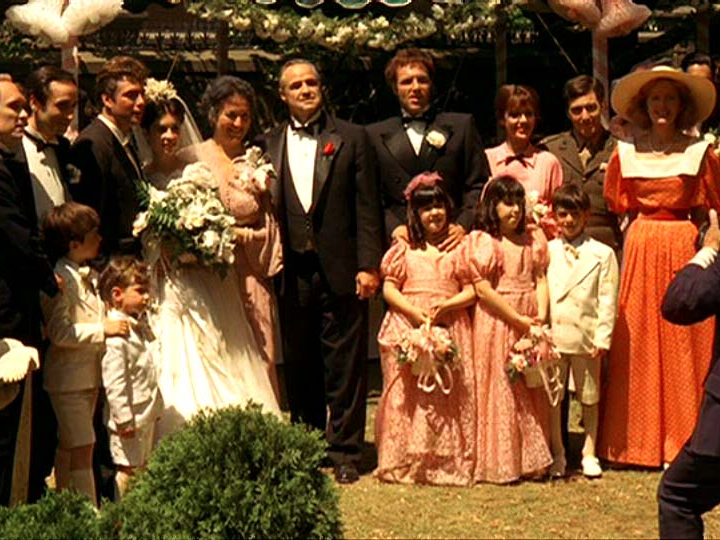The Corleone family secret.

In The Godfather Part III, Michael Corleone attempts to explain Fredo’s death to his sister, Connie, but the conversation reveals more than he intends. Michael frames Fredo’s murder as an act of necessity, a consequence of Fredo’s betrayal that threatened the family’s survival. He tells Connie that what he did was necessary to maintain the family's strength, implying that Fredo’s actions—betraying Michael by working with Hyman Roth—left him no choice. Michael describes the act as something that was “good for the soul” to confess, portraying it as an act of justice for the sake of loyalty and duty.
However, Michael’s explanation to Connie is only a half-truth. While he tries to justify Fredo’s death as a decision made for the good of the family, Michael is concealing a deeper, more personal truth. He cannot bring himself to admit that Fredo was not the weak, foolish brother he pretended to be. In reality, Fredo had long hidden a deeper strength, an emotional intelligence that Michael had failed to recognize until it was too late. Fredo’s betrayal wasn’t just about jealousy or a need for recognition; it was a more complicated power play from a brother who had felt undervalued his entire life.
Connie, however, wasn’t fooled by Michael’s half-truth. As Michael explained why Fredo had to die, Connie pleaded with him, making it clear that she understood the real reason behind Michael’s decision. She knew that Fredo’s death wasn’t just about maintaining control or punishing a betrayal—it was also about Michael’s own insecurities. Connie understood that Fredo had outmaneuvered Michael emotionally, and that this realization was what truly broke her brother. Michael couldn’t allow anyone to know this, especially within the family, as it would expose his greatest weakness: the fact that he had underestimated Fredo, and by extension, his own judgment.
Connie reminded Michael of Fredo’s drowning—a key moment that exposed the shared guilt they both carried. The staged drowning on Lake Tahoe was supposed to be a secret between Michael and Al Neri, the hitman who carried out the execution, but Connie’s reference to it served as an acknowledgment that she knew the truth. Her mention of the drowning wasn’t just about the physical act of killing Fredo; it was an admission that both she and Michael were complicit in hiding Michael’s vulnerability. By reminding Michael of that moment, Connie was confronting him with the reality that they both knew: the act of killing Fredo wasn’t just an execution of justice, but a way for Michael to bury his own emotional failure.
Connie’s plea was her way of telling Michael that she had seen through his attempt to rationalize the murder. She knew that Fredo wasn’t the simple, jealous brother Michael wanted to portray him as, and she recognized that Michael’s cold decision to have Fredo killed came from a place of insecurity. Fredo had challenged Michael’s authority in a way that no one else had, not by physical force or betrayal alone, but by exposing the emotional side of the family’s dynamic that Michael had always tried to suppress.
Michael’s response to Connie’s plea showed his deep internal conflict. He maintained his stoic exterior, still insisting that Fredo’s death was justified, but for the first time, Michael was visibly shaken. He couldn’t admit to Connie—or even fully to himself—the full scope of why Fredo’s betrayal hurt him so deeply. The truth that Fredo had been smarter, more emotionally perceptive, and more capable than anyone had realized was something that Michael could never openly acknowledge. Doing so would expose Michael’s own vulnerabilities and undermine his control over the family.
In the end, Michael’s confession to the bishop brought him some relief, but the conversation with Connie left the deeper truth buried. Michael’s tears in the aftermath of the confession weren’t just for Fredo’s death—they were for the realization that, despite all his efforts to control the family, he had been undone by his own brother’s hidden strength. Connie’s understanding of the truth only deepened Michael’s guilt, as it meant that Fredo’s death had not wiped the slate clean, but had instead cemented Michael’s failure to fully comprehend the complexity of his own family.
Michael’s final breakdown, crying for the first time over Fredo’s death, was a release of years of guilt and bottled-up emotion. He wasn’t just mourning the loss of a brother—he was grieving over the realization that Fredo had revealed a side of the family, and of Michael himself, that Michael could never control. Fredo’s hidden brilliance and emotional intelligence were traits Michael could never fully understand or match, and killing Fredo was Michael’s way of silencing that reminder of his own inadequacies. Connie’s plea and her mention of the drowning only underscored the shared burden they both carried—one of protecting the illusion of Michael’s strength while knowing the painful truth that Fredo’s death had exposed.
Ultimately, Michael’s inability to share the full truth with Connie showed the profound isolation he felt, as only he knew the depth of his own failure. The weight of Fredo’s death, and what it symbolized about Michael’s internal weaknesses, would haunt him for the rest of his life.
- Audio & Video
- Art & Crafts
- Causes
- Dance
- Drinks
- Fitness
- Food & Drink
- Games & Gaming
- Gardening
- Health
- Home Improvement
- LGBTQ
- Literature
- Music
- Networking
- News
- Partisan Politics
- Religion & Spiritual
- Shopping
- Sports & Recreation
- Vorschau
- Theater
- Wellness


